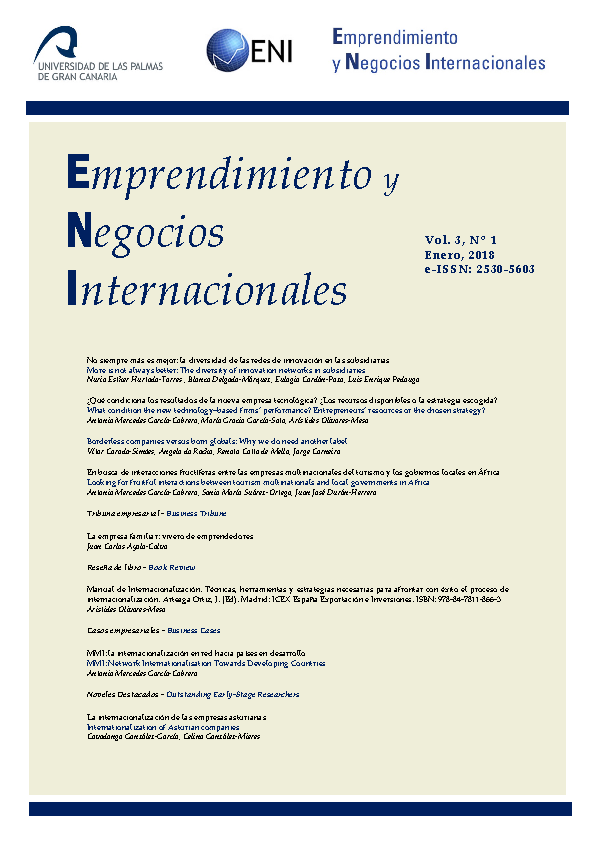Borderless companies versus born globals: Why we do need another label
Resumen
This article is intended to show why borderless firms should be distinguished from traditional born global firms (BGs). Borderless firms have an internationally dispersed configuration of downstream, upstream and support value-added activities, an entrepreneurial team not bounded by a home base, and multinational founders, management teams and/or a multinational workforce. The concept of borderless firms emerged from analysis of empirical evidence and is intended to countervail the excessive focus of BGs literature on downstream activities. Drawing from five case studies, we found that borderless firms may be the result of ex-ante planning. However, most often, the internationally dispersed configuration of value chain activities seems to emerge from effectuation approaches, stemming from networking, including unexpected interactions, which may be envisaged as instruments to overcome constraints or to explore new business opportunities. The article shows that borderless firms present features which differentiate them from traditional BGs. Implications for entrepreneurs and researchers are provided in the concluding section.
Descargas
Citas
Andersson, S., & Wictor, I. (2003). Innovative Internationalisation in New firms: Born Globals - the Swedish Case. Journal of International Entrepreneurship, 1, 249–276.
da Rocha, A., Simões, V.C., Mello, R.C., & Carneiro, J. (2017), “From global start-ups to the borderless firm: Why and how to build a worldwide value system”. Journal of International Entrepreneurship, 15(2), 121-144.
Jolly, V.K., Alahuta, M., & Jeannet, J.-P. (1992). Challenging the incumbents: How high technology start-ups compete globally. Journal of Strategic Change, 1(1), 71-82.
Knight, G.A., & Liesch, P.W. (2015). Internationalization: From incremental to born global. Journal of World Business, 51(1), 93–102.
Kuemmerle, W. (2005). The entrepreneur’s path to global expansion. Mit Sloan Management Review, 46(2), 42–49.
Kuivalainen, O., Sundqvist, S., & Servais, P. (2007). Firms’ degree of born-globalness, international entrepreneurial orientation and export performance. Journal of World Business, 42(3), 253–267.
Oviatt, B.M., & McDougall, P.P. (1994). Toward a Theory of International New Ventures. Journal of International Business Studies, 45–64.
Oviatt, B.M., & McDougall, P.P. (1995). Global start-ups: Entrepreneurs on a worldwide stage. Academy of Management Perspectives, 9(2), 30–43.
Mathews, J.A., & Zander, I. (2007). The International Entrepreneurial Dynamics of Accelerated Internationalisation. Journal of International Business Studies, 38(3), 387–403.
Parker, G.G., Van Alstyne, M.W., & Choudary, S.P. (2016), Platform Revolution: How networked markets are transforming the economy and how to make them work for you. New York: W. W. Norton.
Simões, V.C., Rocha, A. da, Mello, R.C. de, & Carneiro, J. (2015). Black Swans or an Emerging Type of Firm? The Case of Borderless Firms. The Future of Global Organizing (Progress in International Business Research, Volume 10), 179–200.
Simões, V.C., & Martins, G.A. (2017). Borderless Companies: The role of entrepreneurs and network relationships in the development of global value systems. Paper delivered to the 43rd EIBA Conference. Milan, December.
Simon, H.A. (1956). Rational Choice and the Structure of the Environment. Psychological Review, 63(2), 129–138.
Descargas
Publicado
Número
Sección
Licencia
Derechos de autor propuestos por Creative Commons
1. Política propuesta para revistas que ofrecen acceso abierto
Aquellos autores/as que tengan publicaciones con esta revista, aceptan los términos siguientes:
- Los autores/as conservarán sus derechos de autor y garantizarán a la revista el derecho de primera publicación de su obra, el cuál estará simultáneamente sujeto a la Licencia de reconocimiento de Creative Commons que permite a terceros compartir la obra siempre que se indique su autor y su primera publicación esta revista.
- Los autores/as podrán adoptar otros acuerdos de licencia no exclusiva de distribución de la versión de la obra publicada (p. ej.: depositarla en un archivo telemático institucional o publicarla en un volumen monográfico) siempre que se indique la publicación inicial en esta revista.
- Se permite y recomienda a los autores/as difundir su obra a través de Internet (p. ej.: en archivos telemáticos institucionales o en su página web) antes y durante el proceso de envío, lo cual puede producir intercambios interesantes y aumentar las citas de la obra publicada. (Véase El efecto del acceso abierto).

